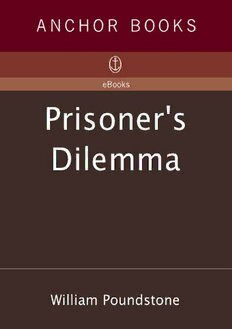
Prisoner's dilemma PDF
Preview Prisoner's dilemma
OTHER BOOKS BY WILLIAM POUNDSTONE Big Secrets The Recursive Universe Bigger Secrets Labyrinths of Reason The Ultimate 2 3 TO MIKOLAS CREWS 4 ACKNOWLEDGMENTS Many of the original group of game theorists at the RAND Cor‐ poration are still well and active. Merrill Flood and Melvin Dresher con‐ tributed importantly to this book with their recollections of their work and of the RAND milieu. Much of the biographical material on John von Neu‐ mann, including the letters quoted, comes from the collection of von Neu‐ mann’s papers at the Library of Congress Manuscript Division, Washing‐ ton, D.C. Some historical information on the Truman administration is based on materials at the Harry S. Truman Presidential Library, Indepen‐ dence, Missouri. Thanks for recollections, assistance, or advice must also go to Paul Armer, Robert Axelrod, Sally Beddow, Raoul Bott, George B. Dantzig, Paul Halmos, Jeane Holiday, Cuthbert Hurd, Martin Shubik, John Tchalenko, Edward Teller, and Nicholas A. Vonneuman. 5 CONTENTS Cover Other Books by this Author Title Page Dedication Acknowledgments 1 DILEMMAS The Nuclear Dilemma John von Neumann Prisoner’s Dilemma 2 JOHN VON NEUMANN The Child Prodigy Kun’s Hungary Early Career The Institute Klara Personality The Sturm und Drang Period The Best Brain in the World 3 GAME THEORY Kriegspiel Who Was First? Theory of Games and Economic Behavior Cake Division Rational Players Games as Trees Games as Tables Zero-Sum Games 6 Minimax and Cake Mixed Strategies Curve Balls and Deadly Genes The Minimax Theorem N-Person Games 4 THE BOMB Von Neumann at Los Alamos Game Theory in Wartime Bertrand Russell World Government Operation Crossroads The Computer Preventive War 5 THE RAND CORPORATION History Thinking About the Unthinkable Surfing, Semantics, Finnish Phonology Von Neumann at RAND John Nash The Monday-Morning Quarterback 6 PRISONER’S DILEMMA The Buick Sale Honor Among Thieves The Flood-Dresher Experiment Tucker’s Anecdote Common Sense Prisoner’s Dilemmas in Literature Free Rider Nuclear Rivalry 7 1950 The Soviet Bomb The Man from Mars 7 Urey’s Speech The Fuchs Affair The Korean War The Nature of Technical Surprise Aggressors for Peace Francis Matthews Aftermath Public Reaction Was It a Trial Balloon? The MacArthur Speech Orvil Anderson Press Reaction How Many Bombs? Coda 8 GAME THEORY AND ITS DISCONTENTS Criticism of Game Theory Utility and Machiavelli Are People Rational? The Ohio State Studies 9 VON NEUMANN’S LAST YEARS The H-Bomb A Very Fine Tiger The Commissioner The Moment of Hope Illness Death 10 CHICKEN AND THE CUBAN MISSILE CRISIS Chicken Volunteer’s Dilemma Volunteer’s Dilemma Experiments The Cuban Missile Crisis The Madman Theory 8 11 MORE ON SOCIAL DILEMMAS Deadlock Stag Hunt Asymmetric Games Justifying Cooperation Howard’s Meta-Game Backward Induction Paradox 12 SURVIVAL OF THE FITTEST Stable Strategies Is Defection in the Genes? Robert Axelrod TIT FOR TAT The Trouble With TIT FOR TAT Artificial Selection The Fish in the Mirror Cooperation and Civilization TIT FOR TAT in the Real World 13 THE DOLLAR AUCTION Escalation Shubik’s Dollar Auction Dollar Auctions in Real Life Strategies Rational Bidding Where Game Theory Fails The Largest-Number Game Feather in a Vacuum Bibliography About the Author Copyright 9 1 DILEMMAS A man was crossing a river with his wife and mother. A giraffe appeared on the opposite bank. The man drew his gun on the beast, and the giraffe said, “If you shoot, your mother will die. If you don’t shoot, your wife will die.” What should the man do? So asks a traditional “dilemma tale” told by the Popo of Dahomey. Odd and difficult decisions like this are widespread in African folklore. Many have been appropriated by Western writers and philosophers. In the Popo tale, you are supposed to imagine that the pronouncements of talking gi‐ raffes are always true. You can restate the dilemma in more Western and technological terms: you, your spouse, and your mother are kidnapped by mad scientists and placed in a room with a strange machine. All three of you are bound immobile to chairs. In front of you is a push button within reach. A machine gun looms in front of your spouse and mother, and a menacing clock ticks away on the wall. One of the scientists announces that if you push the button the mechanism will aim the gun at your mother and shoot her dead. If you don’t push it within sixty seconds it will aim and fire at your spouse. You have examined the machine and satisfied yourself that its remorseless clockwork will perform as stated. What do you do? Dilemmas like this are sometimes discussed in college ethics classes. There’s no satisfactory answer, of course. It’s a cop-out to insist that you should do nothing (don’t push the button and allow the machine to kill the spouse) on the grounds that you cannot be “guilty” for doing nothing at all. You can only decide which of the two you like better and spare that one. Choices are even more difficult when someone else is making a choice, too, and the outcome depends on all the choices made. A similar but more thought-provoking dilemma appears in Gregory Stock’s The Book of Questions (1987): “You and a person you love deeply are placed in sepa‐ 10
